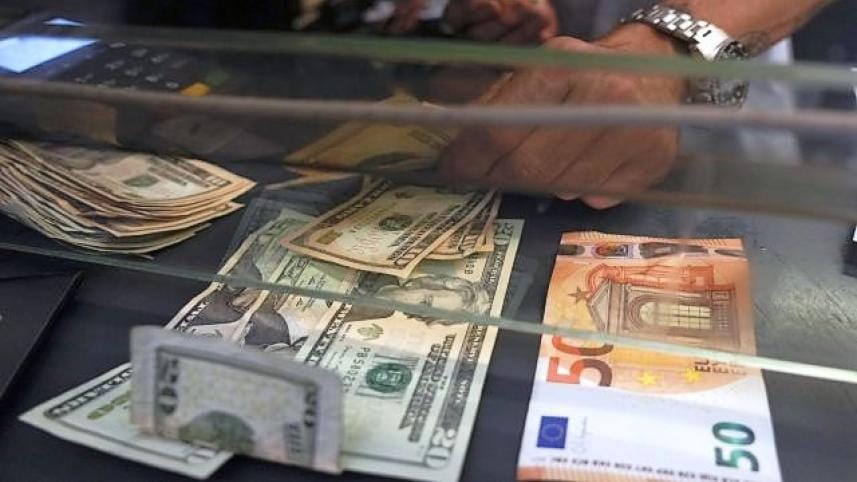Euro equals USD: the good, the bad and the ugly

On July 12, the euro equaled the US dollar, a fall for the former since its journey began in 2002.

The euro was launched in non-physical forms like traveller's checks and electronic transfers in 1999 and three years down the line, the actual paper and coins came into the market. In no time, the European single currency took over the greenback and the two currencies never reached parity till nearly two weeks ago.
The euro has been losing ground against the US dollar since January when one euro fetched a dollar and 13 cents only, against a dollar and 60 cents, a peak it reached in 2008.
The euro matching or dipping below the dollar presents a currency war that has far-reaching impacts on any and every country in the world
Bangladesh Bank recorded a yield of Tk 103.36 for every euro while the dollar transacted at Tk 84.80 on May 31, 2021. On the same day this year, the exchange rates were settled at Tk 96 and Tk 89, respectively.
Further strengthening of the dollar continued through June and finally, the two currencies stood at par on July 12.
WHY IT HAPPENED
The answer lies both within and beyond Europe.
One can easily single out Russia's war on Ukraine as it triggered enormous risks to the EU economy. But there are more.
Amid already skyrocketing energy prices, the Russian shutdown of the Nord Stream 1 natural gas pipeline into Germany on July 11, apparently for maintenance, contributed to the sinking euro sinking deeper.
Stricter regulations and higher taxes made European economies grow at a slower pace in 2018 and 2019. Then Covid-19 arrived and less resilience of the eurozone economies came out in the open. A further hit was the inflationary aftermath of the pandemic.
The political turmoil in Italy was instrumental in driving the euro further down. Italian Prime Minister Mario Draghi resigned last week after one of the parties in his broad coalition, the 5-Star Movement, withdrew its support in a parliamentary confidence vote.
Italy is known to be the third-biggest partner among 19 member states, with the first two being Germany and France.
The European Central Bank appears to be falling behind the US Federal Reserve in tackling inflation. The Fed has been aggressively raising interest rates to stem 40-year high inflation.
On the other hand, the ECB increased interest rates on Thursday, the first hike in 11 years in an attempt to cool rampant inflation, which surged to 8.6 per cent in June, the highest in its history. The ECB raised the benchmark rate up by 50 basis points.
The Fed is expected to go ahead with its plan to hike the benchmark rate by 75 basis points. It raised the rate by the same margin in June.
NOT A WINNER TAKES IT ALL GAME
The euro matching or dipping below the dollar presents a currency war that has far-reaching impacts on any and every country in the world.
A weaker euro propels the cost of imports and fans Europe's already high inflation rate. It is turning European goods cheaper in the world market.
The flip side of a weaker euro is a stronger US dollar. The broad strength of the dollar is good for Americans who are buying from Europe, good for anyone planning a European vacation, good for our manufacturers who sell in America, and good for our expatriates sending US dollars home.
Conversely, the euro's slide is bad for those who earn wages in euros or export from the eurozone, bad for our exporters to this market and bad for our remitters from 19 nations as their dear ones will cash a lesser amount.
Ugly it would be in the longer term as a less potent euro portends slower economic growth for Europe. Some experts are even arguing on Europe heading into a recession. There was talk from all corners that a recession is coming to America and now Europe is added to that.
WHAT IS NEXT
This newspaper ran an AFP article on July 18 that said if Nord Stream 1 does not turn back on, the economic shockwave will be felt worldwide as the European energy crisis could very well trigger a recession.
If gas flows from Russia normalise, or at least stop falling, this should somewhat allay the market fear of an imminent gas crisis in Europe. But the fear is widespread that the halt in deliveries is permanent. In the words of French President Emmanuel Macron: "Russia is using energy as a weapon of war."
Parity may not be the bottom for the euro right now, but a recession is not inevitable yet. While ECB's smarter actions are still in the wings, what Europe needs now is an alternative source of crude.
There are signs coming clearer that global energy relations may take a sharp turn in near future.
New York Times columnists Anatoly Kurmanev and Farnaz Fasshihi wrote on July 13: "The oil competition set off by Russia's invasion of Ukraine already appears to be pushing Venezuela a bit closer to the West, after years of a deep freeze in relations over electoral and human rights abuses by the country's authoritarian leaders."
Iran and Venezuela have shown solidarity with Russia since the start of the war on February 24, but paradoxically, the energy price hike may be moving the interests of Iran and Venezuela a step closer to the West. Both of them have abundant oil, are willing to sell more and can be very useful in America and Europe's search for a new source of energy.
The author is a member of the Pacific Council on International Policy and a former commercial counsellor at the Los Angeles Consulate of Bangladesh. He can be reached at amamoon42@gmail.com



 For all latest news, follow The Daily Star's Google News channel.
For all latest news, follow The Daily Star's Google News channel.
Comments